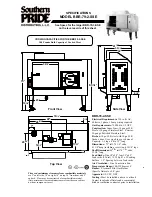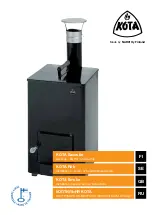
terclockwise as far as the pointer coincides with the high
flame symbol
. If you wish to reduce flame you should
go on rotating the knob counterclockwise as far as it gets
the small flame symbol
.
In the facia-panel you can find a scheme, in respect of
each and every knob, showing the corresponding burner
position.
Electric ignition (if any)
Do not put any pot on the burner. Push the desired burner knob
and rotate it counterclockwise as far as it gets the high flame
symbol
, at the same time push the ignition button
.
The sparks produced by the ignition spark plug will cause
the burner ignition.
Integrated ignition (if any)
Do not put any pot on the burner, rotate the selected burner
knob counterclockwise until the high flame
and push the
knob, in this way automatically switches on the burner.
Flame safety device (if any)
This device is able to stop gas output immediately in case of
flame out.To restart burner repeat the instructions stated abo-
ve according to your appliance model then, keep knob pres-
sed for 10 seconds to start the safety device. Should burner
switch off you should repeat the sequence stated above.
Use flat bottom pots only.
WORK SURFACE
ELECTRIC HEATING
ELEMENTS - FUNCTIONING
AND INSTRUCTIONS FOR USE
General information and precautionary measures
To obtain the highest performance with the lowest electri-
cal input we suggest you to proceed as follows:
- Turn on the power only after having put the pot on the hot
plates or cooking unit.
- Do not use pots with a diameter lower than that of the hot
plates or cooking unit.
- Use flat bottom and high thickness pots. Use lid-fitted
pots.
- Dry the pot bottom before resting it on the hot plates or
cooking unit.
- If cooking times are longer than 40 minutes turn off the
power of the hot plates or cooking unit 5-10 minutes be-
fore the end of the cooking time to exploit the residual
heat.
- Do not use the pyroceram cooking surface as a bearing
surface and also be careful not to hit it with hard and
sharp objects.
- Do not stare at the halogen heating elements of the pyro-
ceram cooking surface.
- Avoid cooking empty pots.
- Do not creep the pyroceram cooking surface with pots or
other objects.
- Avoid pouring liquids.
- Remove poured out liquids from the cooking unit by
means of the scraper purposely studied for pyroceram
cooking surfaces.
- Should the range be fitted with crystal top this might ex-
plode if heated, therefore mind to turn off hot plates or
heating elements before closing the top.
- As soon as you note a crack of the pyroceram cooking
surface disconnect the appliance from the electric supply
immediately.
Work surface includes pilot lights that switch on when the
cooking units temperature is higher than 60°C and switch
off when temperature drops below that value.
Cast iron plates
Cookers may be fitted with the following two different elec-
tric hot plates:
- normal speed
- high-speed (red mark)
Both plates are controlled by selector switches. The main advan-
tage of the high-speed plate is a quicker cooking time. By rotating
the knob clockwise you will read the following symbols:
0 = Hot plate or heating elements OFF
from 1 to 6 = MIN and MAX power positions
On first ignition or if hot plate has not been used for a long
time, it is necessary to turn the selector switch to the 1 po-
sition and leave it there for 30 minutes in order to dry the
humidity absorbed by the insulating element.
Normal heating element for pyroceram cooking surface
Normal heating elements are controlled by selector switches.
Cooking units are identified with circles on the work surface.
Hi-light and halogen heating element for pyroceram
cooking surface
Heating elements are controlled by energy regulators.
Double-circuit Hi-light heating element for pyroceram
cooking surface
The double-circuit heating element is controlled by an energy re-
gulator with a regulation schematic field which goes from 0 to 5.
By rotating the knob clockwise you will read the following
symbols:
l
To switch on a single heating element rotate the knob
clockwise from zero “0” to the desired position.To switch on
the second heating element rotate the knob clockwise as
far as it gets the symbol, then release the knob and set the
desired position.
GAS OVEN - FUNCTIONING
AND INSTRUCTIONS FOR USE
General information and precautionary measures
On first ignition we suggest you to heat oven at the highest
temperature for about an hour keeping the door closed.
This has to be done to remove the odours caused by the
glass wool insulation and working oils. The room windows
should always be open when starting gas oven.
While using the oven the top should always be open to ma-
ke the exhaustion of combustion waste easier.
- Always grasp the central part of the handle to open the
oven door.
- At the end of cooking, on the opening of the oven door you
should always be careful to the boiling fumes emission.
- Always use insulating gloves to put in and to take out pots
from the oven.
- The oven temperature range goes from a minimum of
160 °C to a maximum of 260-270°C
Manual ignition
Open the oven door, light a match and bring it near the
oven burner ignition tube through the slot (between the two
small holes) placed onto the oven hearth front side; push
and rotate the oven knob counterclockwise up to the maxi-
mum position. Once the oven is switched on, keep the
knob pressed for about 5-10 seconds and make sure that
burner stays on by looking at the flames through the two
small holes in the oven hearth front side (see pict. 3 at the
end of this handbook).
Electric ignition (if any)
Always open the oven door, rotate the knob counterclock-
wise up to the highest position, press the button marked
with the following symbol
on the facia-panel; as far
as appliances fitted with integrated ignition (marked with a
star icon) are concerned, ignition will be effected automati-
cally by keeping knob pressed.
Flame safety device
This device (always present) is able to stop gas output au-
tomatically in case of flame out. Repeat the instructions
stated in the previous paragraphs to ignite oven again.
GB
14
Burner
Pot diameter
TC (triple burner)
from 220 to 260 mm
R (large)
from 220 to 260 mm
SR (medium)
from 160 to 240 mm
A (small)
from 120 to 140 mm
Summary of Contents for C50 series
Page 30: ...IT 30 IT ...
Page 31: ......
Page 32: ...ED 4 11 2003 2 12VAR025004 spazio per targa dati GB FR IT ...















































